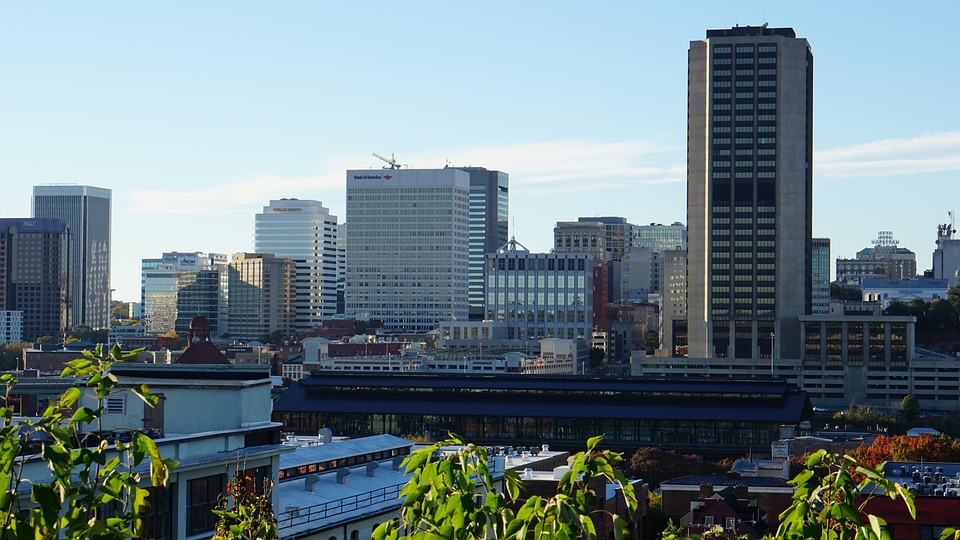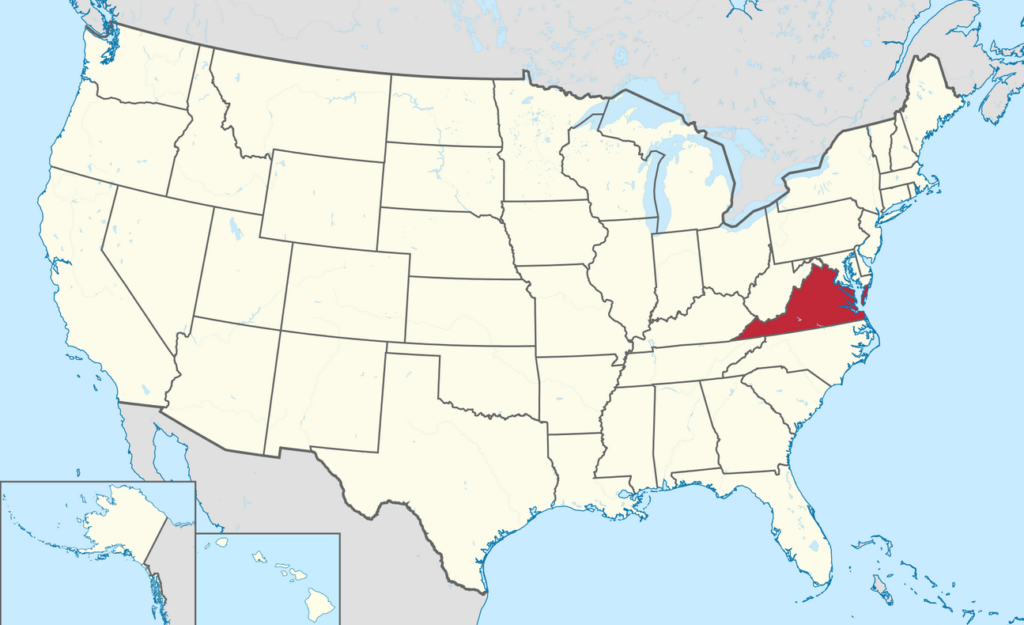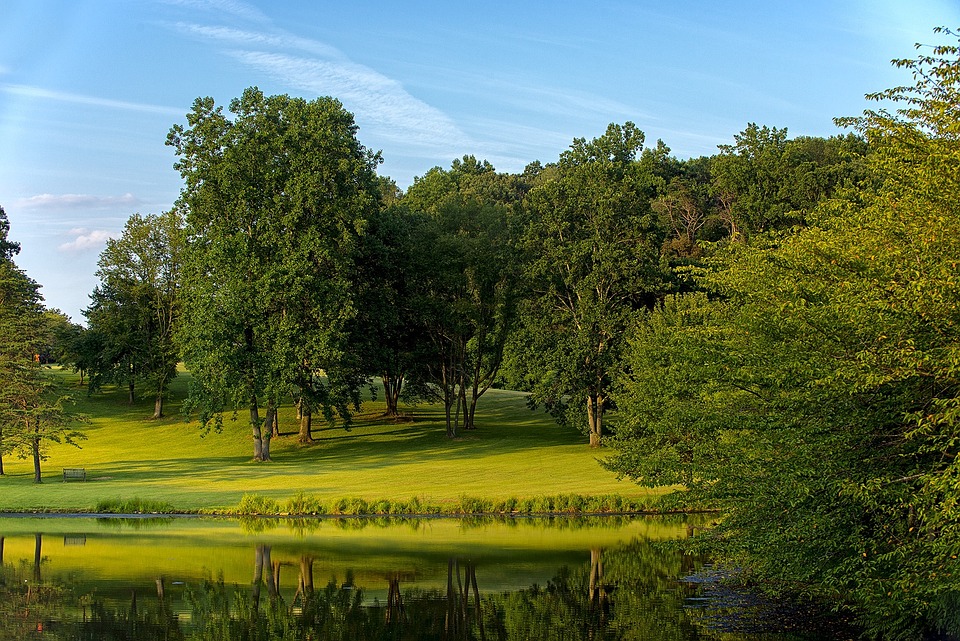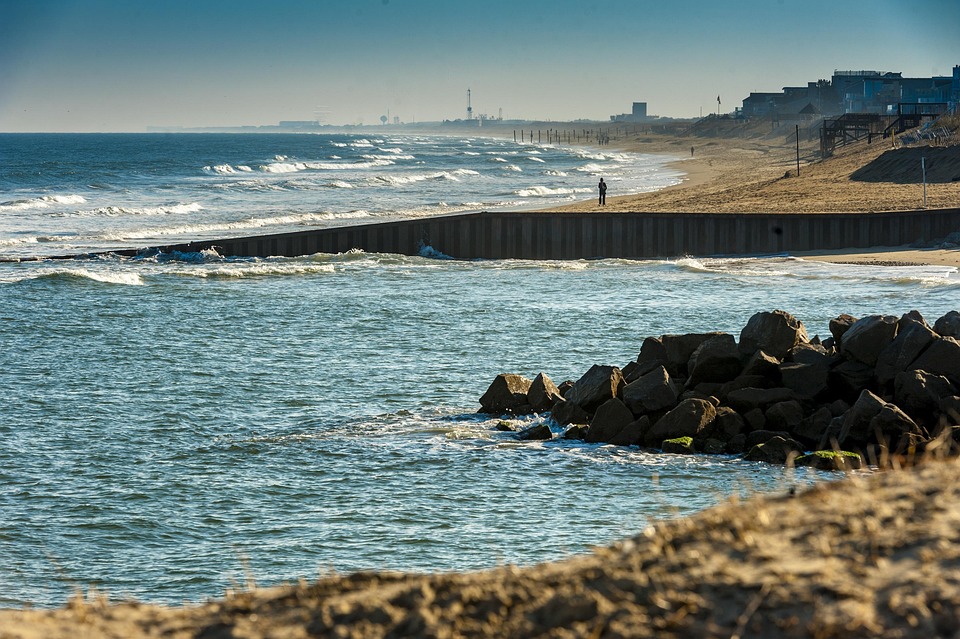Virginia state (USA)

Location of the State of Virginia
The state of Virginia, officially known as “Old Dominion,” is located in the southeastern part of the United States. Virginia holds a special geographical significance as it borders many important states and has access to the Atlantic Ocean.
Borders and Neighbors
- North: Virginia borders Maryland and the District of Columbia, placing it close to the U.S. capital, Washington, D.C.
- West: To the west, the state borders West Virginia and Kentucky.
- South: Virginia shares its southern border with North Carolina and Tennessee.
- East: The Atlantic Ocean and Chesapeake Bay provide access to waterways.
The state’s total area is approximately 110,787 km², making Virginia the 35th largest state. Its territory includes mountains, valleys, coastlines, and fertile plains, creating diverse natural conditions.
Location of Major Cities
- Richmond – the state capital, located in the central part of Virginia.
- Virginia Beach – the largest city in the state, situated on the Atlantic Ocean coast.
- Norfolk – a major port city that, together with Virginia Beach, forms a key metropolitan area.
- Arlington – a suburb of Washington, D.C., and a significant center for business and government institutions.
Geographical Features
Virginia’s location allows it to have diverse terrain:
- Mountains: The Appalachian Mountains in the western part of the state offer stunning landscapes and opportunities for winter sports.
- Plains: The Piedmont and Tidewater regions provide fertile lands that support agricultural development.
- Water Resources: Chesapeake Bay and numerous rivers (James, Potomac, Rappahannock) offer transportation, fishing, and recreational opportunities.

Climate and Landscape of Virginia
The state of Virginia is characterized by a temperate climate with distinct four seasons, making it appealing for living and tourism. Due to its geographical location and diverse terrain, the state experiences significant weather variations depending on the region.
Climate
- Average Temperatures:
- In summer: +25°C to +32°C (77°F to 90°F). In July, the hottest month, temperatures can reach +35°C (95°F).
- In winter: +1°C to -6°C (34°F to 21°F). January is the coldest month, with temperatures in mountain areas dropping to -10°C (14°F).
- Precipitation: Rainfall is evenly distributed throughout the year, with an annual average of about 1,000–1,200 mm (39–47 inches). The wettest months are May and June.
- Snowfall: In winter, snow mainly occurs in mountainous regions, while coastal areas receive more rain.
Climate conditions vary by region:
- Tidewater: The coastal area enjoys a mild climate due to the influence of the Atlantic Ocean.
- Piedmont: The central part of the state is known for its moderate weather.
- Mountainous Areas (Blue Ridge Mountains and Appalachian Plateau): These regions are cooler, with more frequent snowfall.
Landscape
Virginia boasts a diverse terrain, making the state unique in its natural beauty:
- Mountainous Areas: The Blue Ridge and Appalachian mountain ranges dominate the western part of the state. The highest point is Mount Rogers (1,746 m/5,729 ft).
- Valleys: The famous Shenandoah Valley is part of Virginia, attracting tourists with scenic views and national parks.
- Plains: Chesapeake Bay’s shores and the Atlantic coastal plains are vital for agriculture.
- Rivers: The largest rivers are the Potomac, James, and Rappahannock. These waterways are crucial for transportation, fishing, and tourism.
Natural Disasters
Virginia occasionally experiences hurricanes due to its proximity to the Atlantic Ocean, along with strong storms during the summer and fall months. However, the threat of natural disasters is significantly lower than in the southern states.
Virginia’s climate and natural conditions create a comfortable environment for living and recreation.

Population of Virginia
The state of Virginia ranks 12th in population among U.S. states, with approximately 8.7 million residents as of 2023. Its demographic composition, population density, and cultural diversity are key features of the region.
Population Density
The population is unevenly distributed, with the highest concentration in urban areas in the northern part of the state, especially in the suburbs of Washington, D.C. (Arlington and Fairfax). Population density in these areas exceeds 500 people per square kilometer, while rural areas, particularly in the western part of the state, are much less populated.
Ethnic and Cultural Composition
Virginia is characterized by significant ethnic diversity:
- White: About 68% of the population.
- African American: Approximately 19%, one of the highest percentages in the U.S.
- Latino: About 10%, with many coming from Mexico and Central America.
- Asian: 7%, primarily Chinese, Korean, and Indian communities.
- Other Groups: Around 4%, including Native Americans and multiracial communities.
Ukrainian Diaspora
The Ukrainian community in Virginia is a visible part of the population, particularly in the northern areas like Arlington, Alexandria, and Fairfax. The diaspora is united around cultural and religious centers. Key aspects of the Ukrainian presence in Virginia include:
- Cultural Centers: Ukrainian organizations host festivals, Independence Day celebrations, concerts, and exhibitions dedicated to Ukrainian culture.
- Religious Communities: Ukrainian Orthodox and Greek Catholic churches play a significant role, such as those in Arlington and Richmond.
- Language Schools: Weekend schools operate in the region, teaching the Ukrainian language, history, and culture to younger generations.
Ukrainians in Virginia are also active in volunteer and humanitarian projects aimed at supporting Ukraine. Over recent years, the community has intensified its efforts in response to the challenges faced by their homeland.
Primary Language Groups
English remains the main language (87%), but the growth of migrant communities has made other languages, such as Spanish, Korean, Ukrainian, and Vietnamese, increasingly common.
Education and Economic Status
Virginia has one of the highest education levels in the country. About 38% of residents have higher education degrees, and the high school graduation rate exceeds 90%. The state also ranks in the top 10 for per capita income in the U.S., reflecting a high standard of living.
Urbanization
Most of the population lives in urban areas such as Richmond, Norfolk, and the metropolitan region of Virginia Beach. A significant portion of residents work in government institutions, IT, healthcare, and the defense industry.
The population of Virginia is a combination of centuries-old traditions, ethnic diversity, and a high degree of urbanization, making it one of the most fascinating states to live in. The Ukrainian diaspora plays an important role in the state’s cultural diversity, enriching it with their traditions and active participation in public life.
Crime in Virginia
The state of Virginia is known for having one of the lowest crime rates among U.S. states, making it an attractive place to live. However, safety levels can vary depending on the city or neighborhood.
Overall Crime Rate
As of 2023, the violent crime rate in Virginia is approximately 208 incidents per 100,000 people. This is significantly below the national average (395 incidents per 100,000 people). Similarly, property crime rates are also lower than the U.S. average.
- Violent Crimes: Assaults, homicides, and robberies are relatively rare.
- Property Crimes: Burglaries, car thefts, and fraud are more common but remain at manageable levels.
Safest Regions
Many areas in Virginia are considered some of the safest in the U.S.:
- Low-Crime Cities: Northern Virginia, particularly Arlington and Fairfax, are known for their high safety levels.
- Small Towns: Places like Purcellville and Great Falls report nearly zero violent crime.
Problematic Areas
While the overall statistics are positive, some cities and neighborhoods have higher crime rates:
- Norfolk: Despite its cultural significance and port status, this city has a higher-than-average crime rate, particularly in poorer neighborhoods.
- Portsmouth: This area has one of the highest violent crime rates in the state.
Virginia’s Economy
Virginia’s economy is among the most stable and developed in the United States. The state benefits from a strategically advantageous location, access to major transportation hubs, and strong performance in government, technology, defense, and agriculture.
Key Indicators
- GDP Rank: 13th among all states.
- Gross Domestic Product (GDP): Over $630 billion (2023).
- Unemployment Rate: One of the lowest in the country at approximately 3.0%.
- Minimum Wage: $12 per hour, with an increase to $15 per hour planned by 2026.
- Median Household Income: $81,947 per year (5th highest in the U.S.).
- Poverty Rate: Around 10%.
Major Industries
- Government Sector: A significant portion of the population works in government agencies, particularly in Washington, D.C. Virginia is also home to the Pentagon, the largest administrative complex in the world.
- Technology: Northern Virginia is renowned for its strong IT sector, leading in software development, cybersecurity, and data centers.
- Defense Industry: Due to its proximity to federal institutions, Virginia is a key state for defense contracts. Norfolk hosts the largest naval base in the world.
- Agriculture: The state is a major producer of soybeans, corn, tobacco, and poultry.
- Tourism: Unique historical landmarks, Atlantic coast beaches, and national parks attract millions of tourists annually.
Transportation Infrastructure
- Norfolk serves as a major transportation hub with its port ranking 3rd in the U.S. for container traffic.
- Major airports include Washington Dulles International Airport (IAD) and Richmond International Airport.
- Virginia has a well-developed interstate highway network, facilitating logistics and freight movement.

Virginia for Business
Virginia is one of the most business-friendly states in the United States. Thanks to its strategic location, developed infrastructure, and government support, the state has become attractive to entrepreneurs and large corporations. A key feature of Virginia is its proximity to Washington, D.C., which provides access to federal contracts and international markets.
Virginia’s economic policies are aimed at creating favorable conditions for business development. The corporate tax rate is 6%, one of the lowest on the East Coast. The sales tax averages 5.3%, although additional fees may apply in certain counties. The state actively supports entrepreneurs through various programs, including tax credits and grants for companies that create jobs or invest in underdeveloped regions.
Virginia offers infrastructure that meets the needs of modern business. The Port of Norfolk is one of the largest in the country and provides transportation links to international markets. Its network of airports, including Washington Dulles International Airport, facilitates quick access to regional and global markets. Additionally, an extensive highway system makes it easy to transport goods within the state and beyond.
The state is known for its highly skilled workforce. Many residents hold higher education degrees, and universities such as the University of Virginia and Virginia Tech produce graduates ready to work in high-tech industries. Northern Virginia is a hub for the IT industry, cybersecurity, and research, making the state attractive to innovative businesses.
Virginia is home to numerous major corporations, including Amazon, Northrop Grumman, Capital One, Hilton Worldwide, and Mars, Inc. Their presence demonstrates that Virginia offers a favorable business climate for both national and international companies.
Despite its many advantages, doing business in Virginia does have challenges. For example, high demand for real estate in Northern Virginia results in significant costs for renting or purchasing commercial property. Additionally, competition in high-tech sectors is intense, and businesses need to be prepared for a dynamic environment.
Real Estate in Virginia
The Virginia real estate market is among the most dynamic in the U.S. In Northern Virginia, areas like Arlington and Fairfax feature median home prices ranging between $650,000 and $750,000, largely due to their proximity to the nation’s capital. On the eastern side, in regions like Virginia Beach, home prices are significantly lower, averaging $350,000–$400,000. In rural areas to the west, housing remains the most affordable, with average home prices around $200,000.
Rental prices also vary widely. In cities, a one-bedroom apartment can cost between $1,500 and $2,500 per month, while smaller towns offer significantly cheaper options.
Real Estate Market for Investors
Investing in Virginia real estate is a promising opportunity due to stable price growth and strong demand. Northern Virginia is particularly appealing to investors because of the concentration of government offices and technology companies. Commercial properties such as office buildings and shopping centers are especially popular, offering consistent revenue streams.
The state’s coastline also holds great potential for tourism-related real estate, including hotels, apartments, and short-term rental homes. For instance, in Virginia Beach, demand for tourist housing grows steadily, especially during the summer months.
Features of Property Purchase
The process of purchasing property in Virginia is straightforward for U.S. residents. Buyers can benefit from government-backed financing programs that provide favorable terms for first-time homebuyers. In rural areas, special low-interest loans are available to stimulate regional development.
However, non-residents may face challenges due to restrictions in financing and market regulations. It’s also important to consider local property taxes, which vary by county. Northern regions often have higher tax rates compared to more remote areas.
Ecology in Virginia
Virginia is known for its diverse natural environment, which forms a unique ecosystem. Despite urbanization and significant economic development, the state actively works to preserve its natural surroundings while facing several ecological challenges.
Natural Wealth
Virginia boasts a variety of natural landscapes, including mountains, forests, rivers, the Atlantic Ocean coastline, and Chesapeake Bay. The state is home to numerous species of flora and fauna, and its national parks, such as Shenandoah National Park, attract visitors with their breathtaking beauty.
- Mountainous Regions: The Blue Ridge Mountains are a vital biodiversity hotspot, sheltering rare animal species.
- Chesapeake Bay: One of the largest estuaries in the U.S., known for its fishing industry, especially for oysters and blue crabs.
Environmental Initiatives
Virginia is a leader among states in implementing conservation measures. The state government and private organizations are actively involved in several key areas:
- Chesapeake Bay Cleanup: Programs aim to reduce pollution from farms and urban areas.
- Green Energy Development: The state invests in wind and solar energy projects, particularly in coastal regions.
- Forest Protection: Forests are safeguarded from logging and actively restored.
Environmental Challenges
Despite its successes, Virginia faces several ecological issues:
- Water Pollution: Challenges include waste runoff into Chesapeake Bay and other water bodies.
- Climate Change: The state is experiencing the effects of rising sea levels, particularly in coastal areas like Norfolk.
- Intensive Urbanization: City expansion leads to the loss of natural habitats, affecting biodiversity.

Notable Places in Virginia
Virginia is rich in historical landmarks, natural wonders, and cultural attractions, making the state a popular destination for tourists and residents alike. Due to its significance in U.S. history and unique landscapes, Virginia attracts millions of visitors every year.
Historical Landmarks
Virginia is often referred to as the birthplace of the American nation. One of its most iconic locations is Jamestown—the first permanent English settlement in North America, founded in 1607. Nearby is Colonial Williamsburg, a restored 18th-century town that preserves the architecture and atmosphere of colonial America, allowing visitors to experience the daily life of that era.
Another key site is Mount Vernon, the estate of the first U.S. president, George Washington, where visitors can learn about his personal life and contributions to the nation.
Natural Locations
Virginia’s natural scenery is breathtaking. Shenandoah National Park is one of the most popular destinations for outdoor recreation, offering hiking trails, waterfalls, and panoramic views of the Blue Ridge Mountains. The Skyline Drive, which winds through the park, is considered one of the most scenic drives in the United States.
The Chesapeake Bay is another stunning natural site, ideal for fishing, boating, and wildlife observation. Meanwhile, in the southeastern part of the state, the beaches of Virginia Beach attract sun lovers and ocean enthusiasts looking for relaxation and water activities.
Cultural and Artistic Locations
Virginia’s cultural life thrives with numerous museums, theaters, and art centers. In Richmond, the Virginia Museum of Fine Arts houses collections ranging from European masters to contemporary works.
In Norfolk, visitors can explore Nauticus, a maritime museum and science center featuring interactive exhibits, including the USS Wisconsin, a historic battleship.
Virginia’s cultural heartbeat can also be felt in smaller towns, which host vibrant music festivals such as the Bristol Bluegrass Festival, highlighting the region’s rich musical heritage.
Why People Move to Virginia
Virginia attracts new residents with its high quality of life, stable economy, and abundant opportunities for work and recreation. The state combines historic charm, modern infrastructure, and natural beauty, making it ideal for those seeking a balance between work and life.
Economic Opportunities
One of the main reasons people move to Virginia is its strong economy and low unemployment rate. Proximity to Washington, D.C., provides countless job opportunities in government, defense, and the IT sector. Northern Virginia, especially areas like Arlington and Fairfax, serves as a hub for major technology companies such as Amazon, Northrop Grumman, and Capital One.
The state’s economy ensures high wages: the median household income in Virginia exceeds $80,000 per year, one of the highest in the country. This allows residents to maintain a comfortable standard of living.
High-Quality Education
Virginia boasts one of the best education systems in the U.S. The state is home to prestigious universities, such as the University of Virginia (UVA) and the Virginia Tech. Schools in Northern Virginia consistently rank among the best in the nation, making the region particularly appealing for families with children.
Natural Beauty and Recreation
Virginia’s mild climate and diverse landscapes create ideal conditions for outdoor activities. The Blue Ridge Mountains, Shenandoah National Park, the beaches of Virginia Beach, and Chesapeake Bay offer endless opportunities for hiking, boating, fishing, and enjoying nature.
Cultural Diversity and Historical Heritage
Virginia is a cultural and historical center of the United States. The state offers various festivals, cultural events, and historical sites that reflect its rich heritage. Colonial Williamsburg, Mount Vernon, and Arlington National Cemetery are just a few of the landmarks that attract new residents.
Balance Between City and Nature
Many people choose Virginia for its ability to offer suburban and small-town living, where the pace of life is calmer and nature is more accessible. At the same time, modern cities like Richmond and Norfolk provide all the amenities of urban living.
Potential Drawbacks
Despite its many advantages, Virginia also has some challenges:
- Cost of Living: In Northern regions, particularly near Washington, D.C., housing costs and taxes are relatively high.
- Traffic Congestion: With a large population and proximity to the capital, traffic in Northern Virginia can be a major issue.
- Unpredictable Weather: The region occasionally experiences hurricanes and severe storms, especially in coastal areas.
What Else You Need to Know About Living in Virginia and for Newcomers
Moving to Virginia can be an exciting and enriching experience, but as in any state, there are certain quirks, unwritten rules, and interesting facts that newcomers should know.
Interesting Facts About Virginia
- “Virginia is for Lovers” – This is the official tourism slogan, created in 1969, which has become a well-known brand promoting romantic getaways and vacations.
- The Birthplace of Presidents: Virginia is the birthplace of 8 U.S. presidents, more than any other state. This includes George Washington, Thomas Jefferson, and James Madison.
- Traffic Congestion: Northern Virginia is home to some of the busiest highways in the country due to its proximity to Washington, D.C. Newcomers should prepare for heavy traffic during rush hours.
- A Rich History: Virginia played a crucial role during the Civil War, and historical landmarks are scattered across nearly every town and city.
Unusual Laws in Virginia
Like many U.S. states, Virginia has laws that might seem odd or unusual:
- No Swearing in Public: State law prohibits the use of profanity in public places. Offenders may face a fine.
- Sunday Laws: In some counties, so-called “blue laws” used to restrict the sale of alcohol and certain purchases on Sundays. While they are no longer strictly enforced, local customs may vary.
- Driving Restrictions: For example, it is illegal to drive barefoot in Virginia. While rarely enforced, this law still exists on the books.
Unwritten Social Rules
- Road Manners: Virginians are polite drivers, but they expect others to follow road etiquette. For example, the left lane on highways is for passing only, and drivers blocking it are frowned upon.
- Respect for History: Locals take great pride in Virginia’s historical heritage. When visiting historical sites or military memorials, it’s important to show respect and behave appropriately.
- Community and Volunteerism: Virginians actively participate in community initiatives. Volunteering is encouraged, and newcomers can easily join local efforts, such as environmental cleanups or school support programs.
Useful Tips for Newcomers
- Weather Can Be Unpredictable: Be prepared for all four seasons. Summers can be hot and humid, while winter in mountain regions can bring heavy snowfall.
- Taxes: Keep in mind that Virginia has property taxes and sales taxes, which vary by county. Tax rates are notably higher in Northern Virginia.
- Immigrant Communities: Large cities and suburbs have thriving immigrant communities, offering support and networking opportunities. Ukrainian, Polish, and Korean communities, in particular, are very active.
Living in Virginia combines traditional culture, a modern lifestyle, and stunning nature. Understanding these aspects will help newcomers adapt quickly and fully appreciate the advantages of this unique state.
Table of Contents